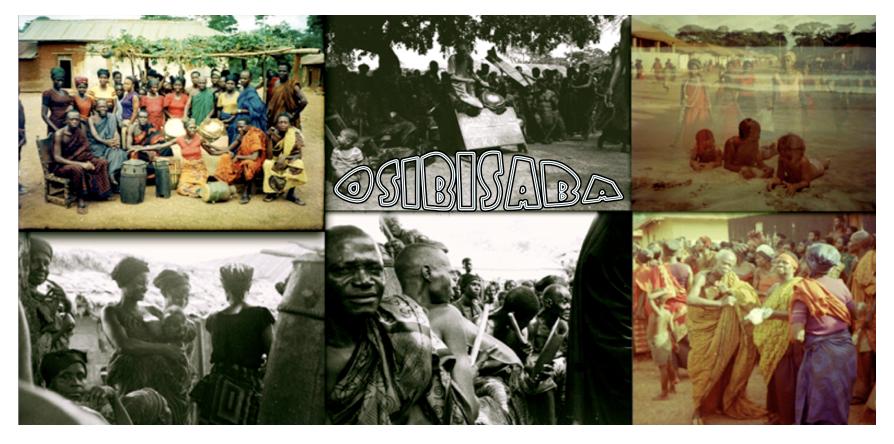Moving away from popular music for the moment, I would like to present "Adowa," a traditional genre/dance of the Asante of Ghana. Like other traditional music genres, Adowa combines drumming and percussion with dancing and call-and-response style singing. This music serves a profound social function, as Adowa is a dance that is performed at and often associated with funerals. Accordingly, song texts are frequently philosophical in nature, meditations on life, death, and humankind itself.
This particular recording by
Onyame Nkrabea Nwomkro features three twenty-minute long tracks in medley style. The drummers maintain a minimal presence throughout, allowing the powerful chorus of singers to take the forefront. This music is beautiful and stunning, and I find myself totally absorbed in the complex melodic lines sung by the lead singers and the lead drummer's varied Atumpan phrases.
Please read below for some more detailed information on Adowa:
"The [Ensemble] includes one or two bells - dawuro (boat-shaped) or slit-type called adawuraa; one or two hourglass drums called donno; one sonorous drum played by the hand called apentemma; one tenor drum played with stick called petia; and a talking drum called atumpan.
With the exception of the bells which may be played by women, the rest of the instruments are played by men, while women form the chorus. Normally one of the bells is regarded as the 'primary' bell while the other bell functions as 'the bell that crosses.'
The hourglass drum plays something in simple duple thyrhms. Where there are two, the second one plays cross rhythm. The main function of the apentemma drums is to suply recurring high-pitched tones. The drummer works in patterns of low and high pitches. The basic rhythm of the peti is a simple 5-note phrase made up of alternating simple and duple rhythmic motif rather like the primary bell.
The atumpan is the most important of all the instruments in the ensemble. When the music starts, the drummer may first make an announcement of drums or give a short message of sympathy. Immediately after this, he may begin with first, the introductory rhythms, and then other rhythms follow, to give the dancer the opportunity to find his bearing or time. This could be followed by other rhythmic motifs, all these go to animate the dance."
- "African Music: Traditional & Contemporary," Alexander Akorlie Agordoh
The meaning of the word "Adowa" is interesting in itself. Adowa is the Asante name for the Royal Antelope (pictured right), one of the rarest and smallest of the antelope species (about the size of a house cat). This tiny animal is considered exceedingly graceful in its movements, and it is this type of graceful movement that Adowa dancers must imitate and express. The Adowa genre, then, is named after this small antelope.
I've already introduced the Atumpan drums briefly in
this post. Played in pairs of two differently pitched drums, the
Atumpan is used to express verbal phrases, proverbs, and appellations. The experienced player is able to translate these speech patterns (many of which are set phrases) onto the
Atumpan based upon the different tones of the
Twi language. In Adowa another layer of complexity is added. Here, the lead drummer plays set Adowa phrases on the Atumpan that correspond to specific dance actions. In effect, this drummer controls the dancers' steps and motions by playing through a commonly recognized repertoire of drum proverbs/phrases.

 "Since 1969, the African Brothers Band organized a yearly “Miss African Brothers Band Int.” which was very highly patronized. The criteria for the competition was not so stringent but was limited to females who were not above 25 years only. Any contestant who won was crowned Miss African Brothers Band for that year, won a cash prize and records of the band, and was also privileged to attend any of the band commercials or private functions free of charge. The 1st and 2nd runner-ups were also given befitting prizes. The contestants prepared themselves well, especially with hairdo, make-ups and dresses where some were proudly sponsored by designers. The competition was carried on for 9 years from 1969-1978."
"Since 1969, the African Brothers Band organized a yearly “Miss African Brothers Band Int.” which was very highly patronized. The criteria for the competition was not so stringent but was limited to females who were not above 25 years only. Any contestant who won was crowned Miss African Brothers Band for that year, won a cash prize and records of the band, and was also privileged to attend any of the band commercials or private functions free of charge. The 1st and 2nd runner-ups were also given befitting prizes. The contestants prepared themselves well, especially with hairdo, make-ups and dresses where some were proudly sponsored by designers. The competition was carried on for 9 years from 1969-1978."















































